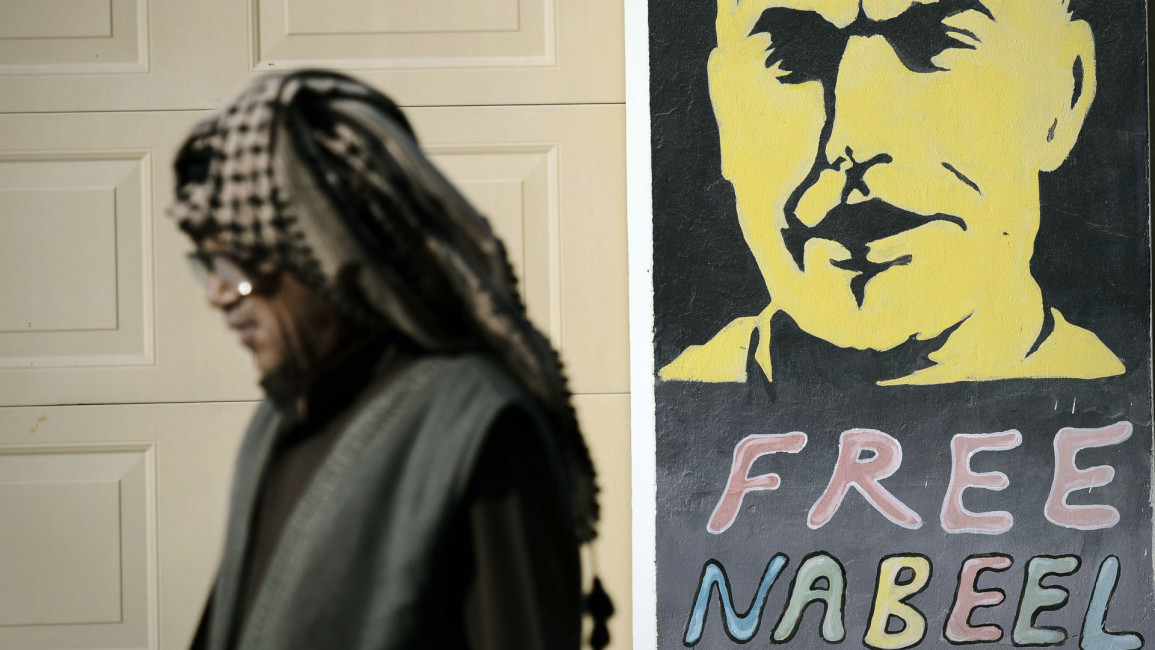Bahrain: Activist Nabeel Rajab in court over 'insulting' tweets
The trial of Nabeel Rajab, head of the Bahrain Centre for Human Rights, comes a day after the authorities in Bahrain blacklisted the main opposition party al-Wefaq for three months.
The prominent human rights defender is accused of posting remarks on Twitter which the government claim are insulting to state bodies.
Rajab was released from prison in May, having served a two year sentence for participating in anti-government protests.
His trial comes as al-Wefaq, the main opposition party, was banned for three months on Tuesday by a Bahraini court, weeks before parliamentary elections.
Al-Wefaq were to boycott the elections.
Criticism
The crackdown on dissent has been criticised by human rights groups and members of the European Parliament.
| Many Bahraini men who joined ISIS came from security institutions... the first ideological incubator. - Nabeel Rajab's offending tweet |
Reporters Without Borders and Reprieve were among the signatories of an open letter to the international community condemning Rajab's arrest, with another letter coming from members of the European Parliament belonging to the Socialist, Democrat and Green bloc.
"We believe that his arrest, interrogation and arbitrary detention in relation to an offending tweet are meant as a form of reprisal against Mr Rajab for his recent advocacy work on behalf of human rights in Bahrain," the MEPs said.
Rajab had tweeted earlier in October that Bahrainis joining Islamist extremists in Syria were originally members of the kingdom's security forces.
"Many Bahraini men who joined terrorism and ISIS came from security institutions and those institutions were the first ideological incubator," he wrote, using the former name of the Islamic State group.
Wefaq ban
Meanwhile, the ban on al-Wefaq means that it will not be able to organise rallies or press conferences, or issue statements or use its offices as the tiny nation's focus turns towards politics.
The move comes less than a month before the first parliamentary elections to be held since Bahrain's 2011 protest movement was crushed by the country's security forces, aided by Saudi troops.
Al-Wefaq had already stated that they would boycott the elections, scheduled for November 2, arguing that the government did not engaged in genuine reconciliation efforts following the protests.
The party called Tuesday's decision "irrational and irresponsible". It pledged to "continue in its struggle for democratic transition and justice".
Bahrain's justice ministry filed a lawsuit earlier this year against al-Wefaq that led to Tuesday's decision. It said it was taking the group to court so it could "correct its legal status" after it allegedly failed to comply with rules of transparency when holding general meetings, according to the state news agency.
Al-Wefaq angered the Bahraini authorities in July by meeting with US Assistant Secretary of State for Democracy, Human Rights and Labor Tom Malinowski.
The party's head, Ali Salman, was charged, along with his political aide Khalil Marzooq, with violating a law on foreign contacts. The US official was reportedly told by authorities that he was "unwelcome" in Bahrain and told to leave the country.
Deportation
Meanwhile, the London-based human rights organisation Amnesty International called on Bahrain to immediately halt the deportation of citizens stripped of their nationality.
The 10 people currently scheduled to be deported are among 31 who were stripped of their nationality in November 2012.
"Arbitrarily depriving these Bahraini citizens of their nationality and forcing them out of Bahrain renders them 'stateless' and goes contrary to Bahrain's international obligations," said Hassiba Hadj Sahraoui, Amnesty's deputy director for the Middle East and North Africa.



